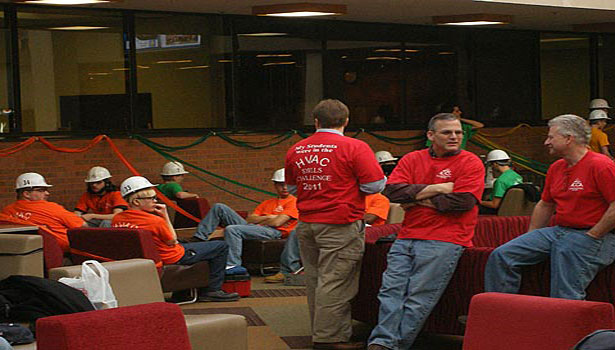
Ingersoll Rand is supporting Purdue University’s entry in the Solar Decathlon. This house, currently under construction at the Purdue campus, will be shipped to Washington, D.C., for the event.
Sponsored by DOE, the Solar Decathlon challenges 20 competitive collegiate teams from around the world to design, build, and operate solar-powered houses that are cost effective, energy efficient, and attractive. The program is designed to educate students and the general public about innovative options for building sustainable communities. The house is currently under construction at the Purdue campus and will be shipped to Washington, D.C., in time for the 2011 Solar Decathlon event, which will take place on the National Mall from Sept. 23 to Oct. 2.
“The mission of the Solar Decathlon is well aligned with Ingersoll Rand’s commitment to deliver innovative products, services, and solutions that enhance energy efficiency, home comfort, and home safety,” said Steve Hochhauser, senior vice president, Ingersoll Rand, and president of Ingersoll Rand Residential Solutions. “As a company that has enjoyed a long-standing relationship with Purdue University, Ingersoll Rand is proud to support the team’s entry into the 2011 Solar Decathlon and see how the solar-powered house can showcase the potential benefits of green living and sustainable design.”
Along with providing financial support and engineering consultation for the construction of the Purdue University home, Ingersoll Rand offered a range of products from its portfolio, including:
• HVAC products that include a high-efficiency Trane XL20i heat pump and a newly designed air handler called Trane Hyperion. The installation will also include an energy recovery ventilator and the Trane CleanEffects air filtering system.
• Schlage LiNK home management system with the new ComfortLink XL 950 II Thermostat.
• Precedent i2 Club Car golf car with solar canopy for the team to use as transport during the construction.
• Ingersoll Rand oil-lubricated twin-stack reciprocating air compressor to power the tools used in the construction of the house.
The entries for the 2011 Solar Decathlon will be rated on a set of criteria that contribute to sustainable living, including architecture, market appeal, engineering, communications, affordability, comfort zone, hot water, appliances, home entertainment, and energy balance.
All homes must be designed to have net-zero energy consumption, which means the house must produce as much energy independently (through the installed rooftop solar panels) as would be required for the occupants to live in it.
Following the 2011 Solar Decathlon event, the Purdue University home will be donated to a nonprofit organization in the local Lafayette, Ind., community.
For more information, visit www.ingersollrand.com.
Publication date:07/25/2011










